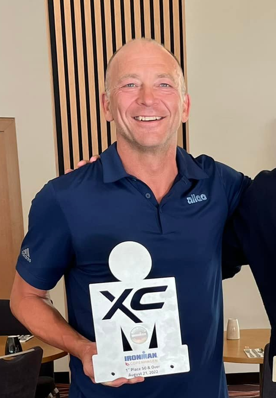|
Navigating Executive Well-Being in a VUCA World
1. Work Pressure and Stress Executive roles often come with intense pressure and stress, which not only affect health but can also impair decision-making and leadership. Managing stress involves navigating it effectively rather than trying to eliminate it entirely. Mindfulness and clear boundaries between work and personal life are crucial strategies. Acknowledging stress as part of the job allows executives to build resilience and coping mechanisms. Endurance training, such as running, cycling, or swimming, is a potent stress reliever. It helps by releasing endorphins, often referred to as the body's natural painkillers and mood elevators. Regular endurance activities can improve sleep quality, reduce symptoms of anxiety, and foster a general sense of well-being. 2. Change and Agility In today's business world, change is constant. Executives need to be flexible and adapt quickly. They should see change as a chance to grow and innovate, not just a problem. Creating a culture that welcomes change, tries new things, and learns from mistakes is vital. Leaders also need to stay ahead of future trends and be ready to switch direction when needed. Endurance training helps executives not only physically but also mentally. The discipline and perseverance they develop prepares them to lead through changes with confidence and flexibility. The visualization techniques and mental agility required to deal with problems during training and racing is a skill that can be ported to the business environment. 3. Productivity and Efficiency In a fast-changing world, being productive means not just doing more in less time but doing the right things well (TriDot podcast). Executives need to prioritize tasks and delegate wisely. Using technology to manage time better, streamline processes, and cut unnecessary meetings creates space for strategic thinking and innovation. Balancing work and personal life is important for staying productive and avoiding burnout. Regular endurance training boosts energy and brain function, making executives more productive. The training routines help with prioritizing tasks and managing time. Executives find that the focus and determination from training help them overcome work challenges with more energy and effectiveness. 4. Team Spirit and Collaboration An organization's success depends on its people. To thrive in a fast-changing world, it's essential to create a culture where teamwork and cooperation are encouraged. Executives should lead by example, promoting open communication, respect, and inclusivity. Embracing diverse viewpoints and working together as a team can lead to more innovative solutions and a stronger, more unified workplace. Recognizing team accomplishments and individual contributions boosts morale and loyalty. Endurance training, especially when done as a group or with a coach, strengthens teamwork and collaboration. Training together or participating in endurance events builds a sense of community, support, and shared success. For executives, this underscores the importance of teamwork, communication, and joint effort in reaching goals, reflecting the collaborative spirit needed for organizational success. 5. Leadership and Personal Growth Executive well-being is closely linked to ongoing personal growth. Leaders must keep learning, seeking new knowledge, skills, and perspectives. This includes both professional and personal development, like improving emotional intelligence and ethical leadership. Investing in oneself not only improves leadership ability but also sets a strong example for the whole organization. Endurance training is a journey of personal growth, teaching valuable lessons in goal setting, perseverance, and overcoming challenges. It fosters a growth mindset and shows that limits can be pushed. For executives, this mirrors the continuous learning needed for effective leadership. Committing to personal health through endurance training also sets a positive example for employees, promoting a culture of health within the organization. CONCLUSION Incorporating endurance training into the lives of business executives offers a multifaceted approach to enhancing well-being in a VUCA world. Not only is it a physical outlet for stress and tension but it also cultivates the mental resilience, agility, and collaborative spirit essential for successful leadership. As executives embrace endurance training, they unlock new potentials in personal health, well-being, and professional performance, paving the way for a more resilient and dynamic leadership style. Don’t forget. It is the small daily steps that turn into positive habits, patterns, and beliefs ingrained in body and mind. Enjoy the journey! BONUS TIP from Coach Glenn
Part of the GR&AT Endurance offering is a higher management journey in which the mental, physiological, and physical benefits of full distance triathlon are leveraged with the strategic requirements of leadership. Contact us for individual or company programs with a commitment to results: from your desk to becoming an Ironman, and a successful leader. Oxygen Series:
Add comments on our social media channels (see header)
Comments are closed.
|
Coach Glenn* Founder and Head Coach GR&AT Endurance Training * Ironman Certified Coach Categories
All
Archives
July 2024
|







 RSS Feed
RSS Feed